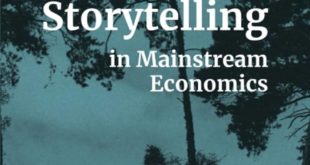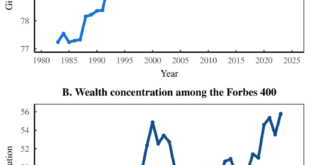from Lars Syll No sooner had I finished my comment on the irrelevancy of economics but I had confirmation — albeit unwittingly — in this morning’s Financial Times. There on the editorial page was a short column by Soumaya Keynes talking about the rise of Hank. For those of you not on the cutting edge, “Hank” stands for Heterogeneous Agent New Keynesian, as in a complicated model of the economy. Hank is a whole new way of looking at model economies, with the really big breakthrough being...
Read More »The eclipse part wo
from Peter Radford What are we to say of a discipline that steadfastly ignores reality in its pursuit of ever more formality in its methods? Wow. Steve Levitt has really shaken me. I come not to mock, but to follow up … Stand up and take a bow Ben Moll! You daring soul. Clearly I need to explain. No sooner had I finished my comment on the irrelevancy of economics but I had confirmation — albeit unwittingly — in this morning’s Financial Times. There on the editorial page was a short...
Read More »Chang’s “Edible Economics”
from Junaid Jahangir and current issue of RWER [Ha-Joon] Chang’s latest book Edible Economics (2022) crystallizes the narrative that he has developed through his popular books over the years. . . . I have reviewed the salient ideas as follows in a bid to draw out lessons I could share with my ECON 101 students. . . . the main ideas of Ha-Joon Chang can be distilled in point form as follows. Neoclassical economics gives precedence to mathematics over real-world issues of inequality and...
Read More »Chicago economics — nothing but pseudo-scientific cheating
from Lars Syll Unlike anthropologists … economists simply invent the primitive societies we study, a practice which frees us from limiting ourselves to societies which can be physically visited as sparing us the discomforts of long stays among savages. This method of society-invention is the source of the utopian character of economics; and of the mix of distrust and envy with which we are viewed by our fellow social scientists. The point of studying wholly fictional, rather than actual...
Read More »The increasing collusion between . . . . . .
from a comment by Ikonoclast “A truth is permitted only a brief victory celebration between the two long periods where it is first condemned as paradoxical and later disparaged as trivial.” – Arthur Schopenhauer. As they break new ground, the Capital as Power theoreticians will encounter the “Schopenhauer Effect” over and over. When you point out something clearly for the first time, or even again after a long interregnum when few could see it, then everyone will say, “Oh, we always knew...
Read More »Wealth catapulted up
from Blair Fix and current issue of RWER Speaking of competition and losers, Ronald Reagan set the tone of the neoliberal era when, in 1981, he fired 11,000 striking air-traffic controllers (Houlihan, 2021). The message? Workers were losers who would be subjected to the discipline of competition. Reagan called it ‘morning in America’. But really, it was ‘morning for American big business’. Today, we are well into the next-day’s hangover, and we know how the party played out. For workers,...
Read More »The need for a new economic paradigm
from Giandomenico Scarpelli and current issue of RWER As documented in the previous paragraph, in recent years it finally seems that most orthodox economists have become more aware of the catastrophic outcomes of climatic disturbances; but at this point the traditional policy they recommend could be insufficient to meet the goals set at international level. In fact, that policy consists mainly of pollution permits and carbon taxes, but if the permits are offered with great generosity and...
Read More »Weekend read – Enlightenment epistemology and the climate crisis
from Asad Zaman Introduction At first glance, it appears that industrialization, with its rampant overproduction and overconsumption, stands as the primary antagonist in our climate crisis narrative. However, this surface-level perception overlooks a more profound shift that lies beneath: an epistemological revolution birthed in the European Enlightenment. This era marked a pivotal transition in our relationship with the planet, from Mother Earth to a dead machine. Turbayne (1962)...
Read More »There ain’t no libertarians, just politicians who want to give all the money to the rich
from Dean Baker David Wallace-Wells had a column discussing the trip by Javier Milei, Argentina’s new president, to the World Economic Forum (WEF) in Davos, Switzerland. The WEF is an annual gathering of many of the world’s richest people, where they also invite politicians, academics, and others who they think may amuse them. According to Wallace-Wells, Mr. Milei definitely fits into that category. The piece talked about how Milei calls himself as an anarchist, with the government just...
Read More »What’s the use of economics?
from Lars Syll The simple question that was raised during a recent conference … was to what extent has — or should — the teaching of economics be modified … The simple answer is that the economics profession is unlikely to change. Why would economists be willing to give up much of their human capital, painstakingly nurtured for over two centuries? For macroeconomists in particular, the reaction has been to suggest that modifications of existing models to take account of ‘frictions’ or...
Read More » Real-World Economics Review
Real-World Economics Review




